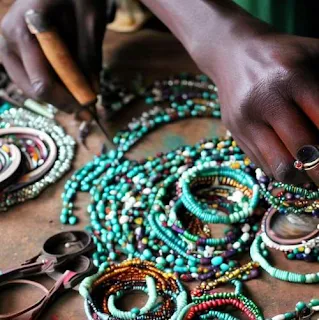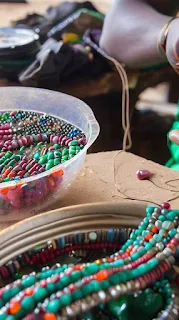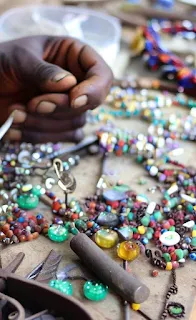Hypoallergenic Glamour: Burundi's Artistic Heritage
The intersection of Burundi's rich artistic heritage and the growing trend of hypoallergenic jewelry made from niobium.
Burundian artisans combine their skills and knowledge of local craftsmanship with the innovative use of niobium, resulting in hypoallergenic, stunning, and culturally significant jewelry designs. Incorporating niobium allows artisans to create jewelry that is not only visually appealing but also safe and comfortable for individuals with sensitivities to other metals.Niobium, a Precious Metal from Burundi, Transforming the World of Jewelry Making
Burundi, a small landlocked country in East Africa, may not be the first place that comes to mind when considering jewelry-making materials. However, this beautiful nation holds a hidden gem in the form of niobium, a precious metal that has revolutionized the world of jewelry making. Niobium's unique properties and Burundi's rich mineral resources have given rise to a burgeoning industry that caters to individuals with metal allergies and a desire for exquisite, hypoallergenic jewelry.
Discovering the Beauty of Niobium.
Niobium, an element with the symbol Nb and atomic number 41, was first discovered in the early 19th century. However, it wasn't until recent years that its remarkable properties garnered attention in the jewelry industry. Burundi, known for its mineral-rich soil, is home to abundant niobium deposits, making it an ideal source of this valuable metal.
Unleashing Niobium's Potential.
One of niobium's most significant advantages lies in its hypoallergenic properties. Many people suffer from metal allergies, reacting to common metals like nickel, copper, or brass commonly found in jewelry. Niobium has a low potential for triggering allergic reactions, making it a sought-after alternative. Jewelry made from niobium provides a safe and comfortable option for individuals with sensitive skin, allowing them to wear beautiful pieces without the fear of irritation or discomfort.
Niobium's corrosion resistance is another key attribute that has propelled its popularity in jewelry making. Unlike many other metals, niobium resists tarnish, rust, and oxidation, ensuring that niobium jewelry retains its luster and durability over time. This resistance to environmental factors, including moisture and chemicals, preserves the pristine appearance of niobium jewelry, delighting wearers and maintaining its beauty for years to come.
The Allure of Niobium Jewelry from Burundi.
The jewelry crafted from niobium showcases the distinctive beauty of this metal. In its natural state, niobium exhibits a cool, grayish color that captivates the eye. However, artisans have discovered an enchanting technique called anodization, which allows them to create a spectrum of vibrant colors on the surface of niobium. A thin oxide layer forms by applying controlled electrical currents, resulting in an array of brilliant hues such as blues, purples, greens, and more. This versatility in coloration enables artisans to create unique, personalized designs, making niobium jewelry a true work of art.
Burundi's Growing Jewelry-Making Industry.
Burundi's economy is predominantly agriculture-based, with coffee and tea being essential commodities. However, the abundance of niobium deposits in Burundi has spurred the growth of a vibrant jewelry-making industry within the country. Local artisans and craftsmen have honed their skills to create intricate and exquisite pieces that showcase the allure of niobium. These skilled individuals incorporate traditional techniques and innovative designs to produce stunning necklaces, earrings, bracelets, rings, and body piercings. Exporting crafts will benefit Burundi’s general economy, especially for women in rural areas who traditionally make the crafts.
Accessing Niobium Jewelry.
Niobium jewelry from Burundi is becoming increasingly accessible worldwide. Retail stores, specialized jewelry boutiques, online marketplaces, and artisanal craft fairs now offer a wide range of niobium pieces. As awareness grows about the benefits of niobium, the demand for this unique metal continues to rise.
The act of shipping crafts globally will bring about a beneficial outcome for the economy of Burundi, with a notable positive impact on the women residing in rural areas who have a deep-rooted tradition of crafting.
Burundi boasts a wealth of skilled artisans in the craft sector, apart from jewelry makers. The local craftsmen specialize in creating exquisite handicrafts such as embroidery, silk paintings, metalwork, sculptures, beading, basket weaving, and wood pyrography. These artistic creations are predominantly intended for the tourist market.
The presence of niobium deposits in Burundi has significantly impacted the jewelry-making industry.
Burundi's niobium deposits have transformed the jewelry-making landscape, offering individuals with metal allergies a safe and stylish alternative. The hypoallergenic and corrosion-resistant properties of niobium, combined with its aesthetic appeal, have propelled it into the forefront of the jewelry industry. The growth of the niobium jewelry sector in Burundi highlights the country's potential as a global supplier of this precious metal. As artisans continue to craft exquisite pieces, niobium jewelry from Burundi promises to captivate the world with its beauty, innovation, and inclusivity.
The fusion of Burundi's artistic legacy with the contemporary demand for hypoallergenic jewelry.





